Related Research Articles
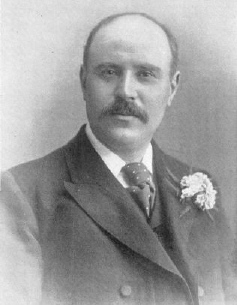
Isidor Arthur Gunsberg was a Hungarian chess player, best known for narrowly losing the 1891 World Chess Championship match to Wilhelm Steinitz.
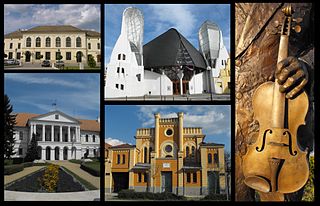
Makó is a town in Csongrád County, in southeastern Hungary, 10 km (6 mi) from the Romanian border. It lies on the Maros River. Makó is home to 21,913 people and it has an area of 229.23 square kilometres, of which 196.8 km2 (76.0 sq mi) is arable land. Makó is the fourth-largest town in Csongrád County after Szeged, Hódmezővásárhely and Szentes. The town is 28.6 km (17.8 mi) from Hódmezővásárhely, 36.2 km (22.5 mi) from Szeged, 75.4 km (46.9 mi) from Arad, 85 km (52.8 mi) from Gyula, 93.5 km (58.1 mi) from Timișoara (Temesvár), and 200 km (124 mi) from Budapest.

Ferdinand Julius Cohn was a German biologist. He is one of the founders of modern bacteriology and microbiology.

Shlomo ben Avraham ibn Aderet was a medieval rabbi, halakhist, and Talmudist. He is widely known as the Rashba, the Hebrew acronym of his title and name: Rabbi Shlomo ben Avraham.

Meir Friedmann was an Austrian-Hungarian Jewish scholar. His editions of the Midrash are the standard texts. His chief editions were the Sifre (1864), the Mekhilta (1870), Pesiqta Rabbathi (1880). At the time of his death he was editing the Sifra. Friedmann, while inspired with regard for tradition, dealt with the Rabbinic texts with modern scientific methods, and rendered conspicuous service to the critical investigation of the Midrash and to the history of early homilies.

Rabbi Solomon Aaron Wertheimer, was a Hungarian rabbi, scholar, and seller of rare books.
Israel ben Solomon Wahrmann was the first officially recognized rabbi of Pest, Hungary.

Joseph Manes Österreicher, Jewish-Hungarian physician; born at Óbuda 1759; died at Vienna, December 14, 1831.
Solomon Löwisohn was a Hungarian Maskilic poet, historian, grammarian, and linguist.
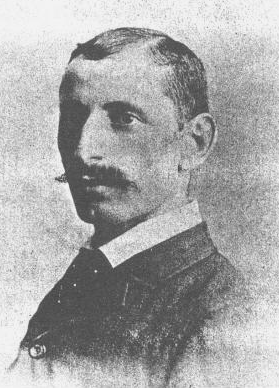
Samuel or Salomon Lipschütz was a chess player and author. He was chess champion of the United States from 1892 to 1894.

Wilhelm Klein was a Hungarian-Austrian archeologist.
Austerlitz is the name of a Jewish family. As is the case with all names derived from places, the surname "Austerlitz" does not necessarily signify that all the persons so named belong to one family. The name originated in Austerlitz (Slavkov), Moravia.
S. H. Sonneschein, Solomon H. Sonnenschein was a Hungarian-American rabbi.
Alexander Büchler was a Hungarian rabbi and educator.
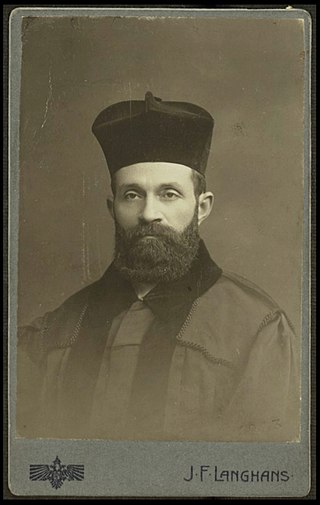
Heinrich Brody (German), Bródy Henrik (Hungarian) or Haim Brody was a Hungarian rabbi. He was born in Ungvár, in the Ung County of the Kingdom of Hungary.
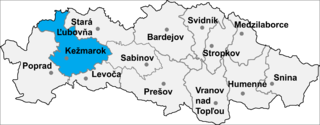
Huncovce is a village and municipality in Kežmarok District in the Prešov Region of north Slovakia.

Solomon Marcus Schiller-Szinessy, sometimes Solomon Mayer Schiller-Szinessy was a Hungarian rabbi and academic. He became the first Jewish Reader in Talmudic and Rabbinic Literature at the University of Cambridge.
Jonathan Alexandersohn was a German-Hungarian rabbi.
Solomon ben Chaim Baruch Brück was a Hebrew writer from Lemberg, Austria. He is the author of Ḥakirat ha-Emet, a volume of collectanea, including an English sermon which he delivered in England. His other work, Ḥezionei Layil, was published posthumously by his son. The work consists of a series of imaginary dream-visits to the other world, in which the manners and conduct of certain classes are severely criticized.
Abraham Placzek was a Moravian rabbi, who served as Landesrabbiner of Moravia from 1851 until his death.
References
![]() This article incorporates text from a publication now in the public domain : Singer, Isidore; Dunbar, Newell (1906). "Winter, Solomon". In Singer, Isidore; et al. (eds.). The Jewish Encyclopedia . Vol. 12. New York: Funk & Wagnalls. p. 536.
This article incorporates text from a publication now in the public domain : Singer, Isidore; Dunbar, Newell (1906). "Winter, Solomon". In Singer, Isidore; et al. (eds.). The Jewish Encyclopedia . Vol. 12. New York: Funk & Wagnalls. p. 536.